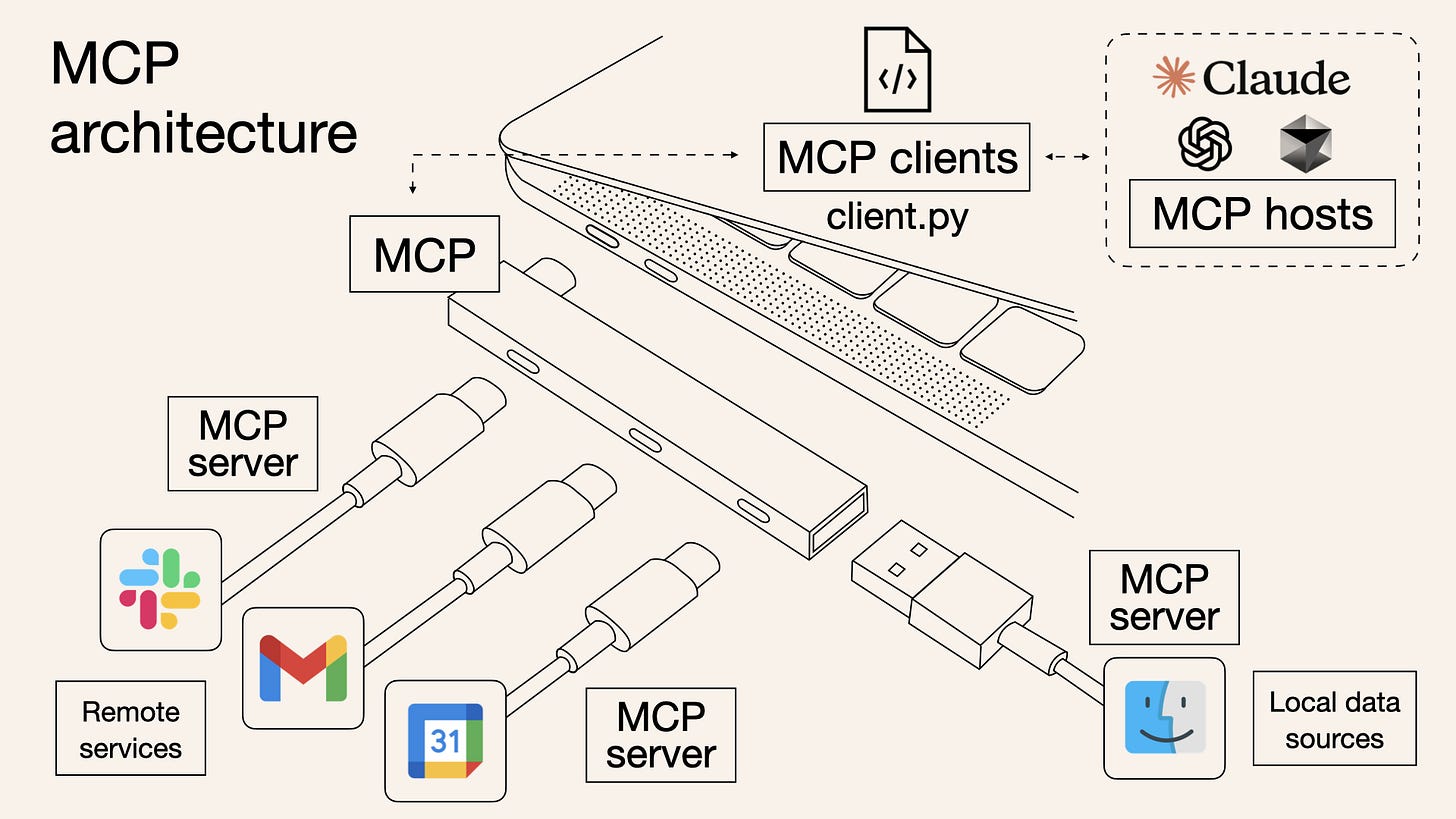MCP: A quick overview
Model Context Protocol general introduction
With MCP rapidly gaining traction in the AI community, I wanted to understand what makes this new protocol suddenly so important.
Let's explore why Model Context Protocol is becoming the standard way for AI to connect to external tools and data.
MCP explained: What exactly is it?
When you build AI applications, you typically need to connect to:
🔹 Databases for retrieving information 🔹 APIs for external services 🔹 File systems for document access 🔹 Other tools your users need
Before MCP, each of these connections required:
Custom integration code
Different authentication methods
Separate maintenance for each service
Significant development overhead
Model Context Protocol creates a standardized way for AI to interact with ALL of these systems through one consistent interface.
Think of it like the USB standard for AI - one protocol to connect everything.
Why MCP matters: The integration problem it solves
Most people don't realize how much time AI developers spend on integrations rather than actual AI capabilities.
The current reality without MCP:
An AI agent that needs to check your calendar, then email a colleague, then update a database requires THREE separate custom integrations
Each integration has its own:
Authentication system
Data formatting requirements
Error handling approach
Maintenance burden
Adding a new tool means writing entirely new code
This is why most AI applications stay limited to a handful of services - integration complexity creates a barrier.
MCP breaks through this barrier with one standard protocol for everything.
Technical breakdown: How MCP actually works
MCP uses a client-server architecture with JSON-RPC messages:
MCP Clients: AI models or applications that want to use external tools
MCP Servers: Services that provide capabilities to the AI
The protocol exposes three key components:
Tools: Functions the AI can call (like "sendEmail" or "searchDatabase")
Resources: Data the AI can access (like files or database records)
Prompts: Templates the AI can use for specific tasks
The magic happens through dynamic discovery - AI models can automatically detect what capabilities are available without being explicitly programmed for each one.
MCP advantages: Why developers are adopting it
The benefits of MCP extend beyond just standardization:
✅ Universal compatibility: Works with any AI model (Claude, GPT, open-source LLMs)
✅ Bidirectional communication: Both retrieving data AND taking actions
✅ Reduced development time: Connect new services in minutes, not days
✅ Future-proof: Add new tools without changing your core application
✅ Context sharing: Maintain conversation state across different tools
As one developer put it: "MCP took our integration time from weeks to hours."
Current limitations: What to be aware of
MCP isn't perfect yet. Current challenges include:
⚠️ Deployment complexity: Primarily local servers for now, though cloud options are coming
⚠️ Security considerations: Authentication and permissions systems are still maturing
⚠️ Performance overhead: Multiple connections can introduce latency
⚠️ Tool quality variance: Effectiveness depends on how well tool interfaces are described
For simple projects with minimal integration needs, MCP might be overkill. But for complex AI applications connecting to multiple systems, the benefits far outweigh these limitations.
Available MCP servers: What you can use today
The ecosystem is growing rapidly. As of March 2025, over 1,000 MCP servers are available for services including:
Slack and Discord
Google Workspace (Gmail, Drive, Calendar)
Database connectors (PostgreSQL, MongoDB)
Notion, Figma, and other productivity tools
CRM systems like Salesforce
Search engines and knowledge bases
Custom enterprise tools
This collection of pre-built servers means you can often find what you need without building from scratch.
The roadmap: What's coming next for MCP
According to the official MCP roadmap, several key improvements are in development:
Remote servers with OAuth: Simplifying cloud deployments
Registry system: Central discovery for available MCP servers
Stateless connections: Improved scalability
Performance optimizations: Reducing latency overhead
Enhanced security: Better authentication and permissions
These improvements address most of the current limitations, positioning MCP to become even more widely adopted.
Real-world example: MCP in action
To illustrate MCP's power, consider this financial advisor AI application:
Without MCP: The developer would need to write custom integrations for banking APIs, investment platforms, spreadsheet access, and email services - each with different authentication, data formats, and maintenance requirements.
With MCP: The developer connects pre-built MCP servers for each service, and the AI can:
Check account balances
Analyze investment performance
Update budget spreadsheets
Send summary reports via email
All through a single, consistent interface - dramatically reducing development time and complexity.
Comparison with alternatives: Where MCP fits
How does MCP compare to other approaches?
Custom API integrations:
Much more development work
Less flexibility and scalability
Higher maintenance burden
OpenAI plugins:
Limited to OpenAI's ecosystem
Less standardized
Primarily one-way information retrieval
LangChain tools:
Developer-focused rather than AI-focused
Requires more code for each integration
Less dynamic discovery
MCP provides a more standardized, flexible, and AI-native approach to tool integration.
Conclusion: The future of AI connectivity
MCP solves a real pain point for AI developers - the integration mess. While it's still early days, MCP has the potential to become the standard way AI systems connect to external tools and data.
Just as USB standardized physical device connections and HTTP standardized web communications, MCP is standardizing how AI interfaces with the digital world.
As the protocol matures and adoption continues to accelerate, we'll likely see MCP become the foundation for more sophisticated AI applications that seamlessly interact with our digital tools and information.
The question isn't whether to use MCP, but when and how to integrate it into your AI development strategy.
What now?
Explore the collection of available MCP servers
Check the official MCP roadmap for upcoming features
Consider which of your AI projects would benefit from standardized tool access
Join the growing MCP community to share experiences and best practices


